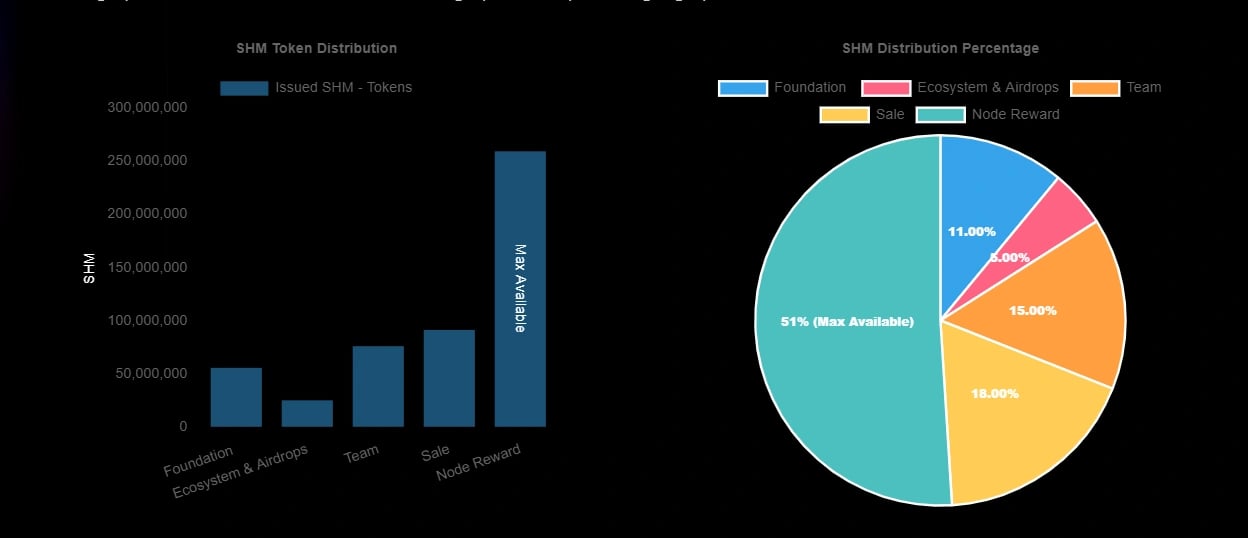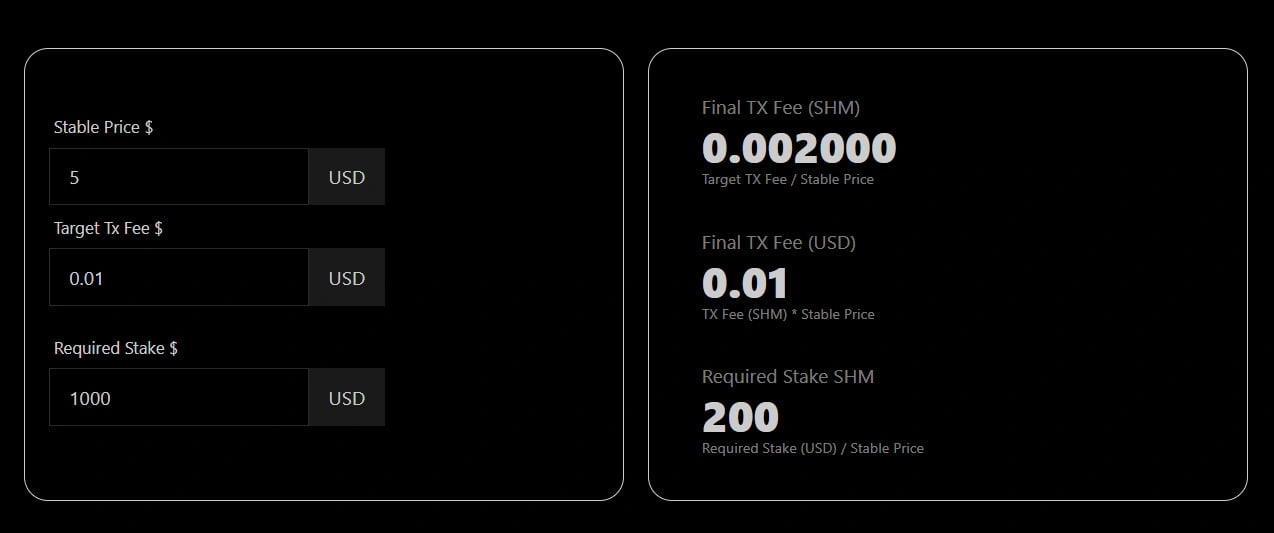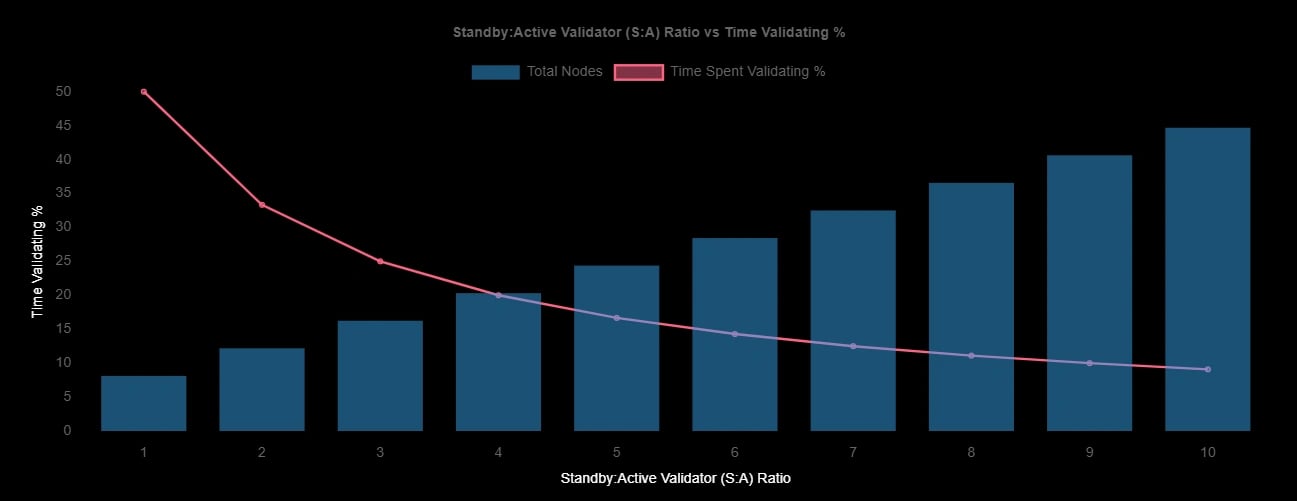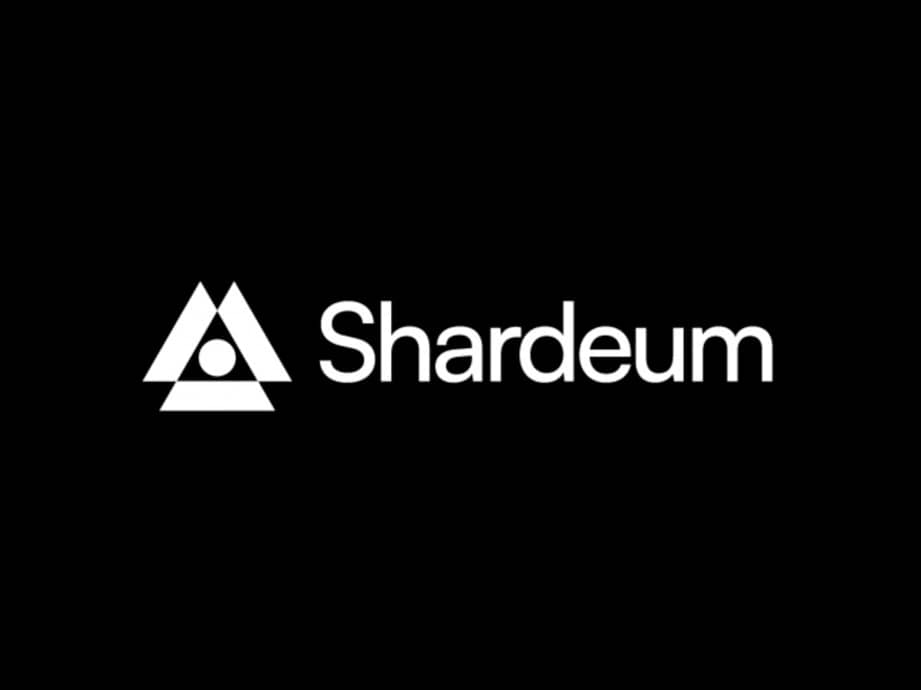Subscribe to wiki
Share wiki
Bookmark
Shardeum
The Agent Tokenization Platform (ATP):Build autonomous agents with the Agent Development Kit (ADK)
0%
Shardeum
Shardeum is a Layer 1 (L1) blockchain, built on the Ethereum Virtual Machine (EVM), that introduces dynamic state sharding to the blockchain space. Through dynamic state sharding, Shardeum aims to achieve linear scalability and preserve atomic composability across its network of shards. This approach was implemented to continuously enhance its transaction processing capacity by accommodating additional validators while ensuring consistently low fees. [1]
Overview
Shardeum was founded in February 2022 and aims to officially launch in Q1 of 2024. One of their goals is to reconcile the blockchain trilemma by achieving scalability, decentralization, and security concurrently. The dynamic state sharding feature enables Shardeum to scale with each new validator while allowing developers to deploy and interact with smart contracts written in Solidity or Vyper without the need for complex sharding considerations. Contracts are automatically distributed across unique shards while preserving interoperability. One of its other key features is the auto-scaling mechanism, which allows the network to adapt the number and size of shards in response to changing workloads, aiming to optimize performance and ensure sustained scalability as the ecosystem grows. With their core principles of being an open, collaborative, and community-driven project, they focus on scalability and composability through sharding [2][13][14]
In January 2024, Shardeum partnered with Spheron. Spheron is a comprehensive solution that is revolutionizing the infrastructure of decentralized applications (Dapps). Spheron added support for Shardeum validator nodes. and users can set up their validator nodes from the Spheron UI. [15]
Key Features
Dynamic State Sharding
Dynamic state sharding represents a key feature of Shardeum's architecture. In contrast to static state sharding, which predefines shard address spaces, dynamic state sharding allows for flexibility and adaptation. Shards in a dynamic system like Shardeum can be created or removed as required to accommodate changes in network conditions. These adaptations, such as shard splitting or merging, node reassignment, and redundancy management, are orchestrated by real-time algorithms. This dynamic approach hopes to ensure that Shardeum can maintain an optimal balance between system load and available resources, leading to efficient and secure network operations. Each validator in Shardeum is responsible for a unique range of addresses, executing assigned transactions, and storing corresponding state changes. Overlapping coverage by validators provides redundancy, ensuring that each address has a minimum redundancy of at least 128 validators. This ensures that if something goes wrong with one validator, there are at least 127 others to take its place. [3][4]
Transaction Consensus
Shardeum employs a hybrid consensus mechanism comprising Proof of Stake (PoS) and Proof of Quorum (PoQ) to validate transactions. In the PoS component, every validator node is required to stake a minimum amount of SHM (Shardeum's native token) to participate in the network. Validator nodes are incentivized to honestly validate transactions, with SHM rewards, while any malicious behavior results in the slashing of staked SHM, reinforcing network security. [7]
The PoQ aspect introduces transaction-level consensus, a departure from the block-level consensus common in other networks. Transaction-level consensus ensures immediate finality and low latency, minimizing network congestion. Transactions are individually validated upon receipt, and timestamped to prevent double-spending. Transaction information is shared among nodes within a shard through gossiping, establishing trustless and leaderless electronic voting or quorum in the form of receipts. Transactions are digitally signed through e-voting, and upon reaching quorum (more than 50% of receipts), they are committed on the network. The consensus algorithm incorporates auto-rotation of validator nodes, further fortifying network security against malicious actors. [7]
EVM Compatibility
Shardeum offers Ethereum Virtual Machine (EVM) compatibility. For Ethereum and Ethereum-based developers, this means a simple transition to Shardeum without altering application codes. Smart contracts written in Solidity or Vyper for EVM can be easily ported to Shardeum, eliminating concerns about rising gas fees. [8]
Shardeum Opcodes
While Shardeum processes transactions individually rather than in blocks, it still generates blocks periodically to support existing smart contracts compatible with JSON RPC specifications. Blocks are scheduled in cycles, with each cycle typically lasting 60 seconds and producing 10 blocks. A transaction's timestamp selects the appropriate block by mapping the timestamp to the block number. In cases where a transaction lacks a timestamp, the network will assign one and select the corresponding block. Shardeum exposes block-related public API endpoints, allowing JSON RPC servers to access the same block information used by the network for enhanced compatibility and interoperability. [9]
SHM Token
SHM serves as the native, utility, and governance token within the Shardeum ecosystem. It is an essential element of the network, offering various functionalities and playing a crucial role in the network's operations. [10]
Supply and Distribution
Max supply: 508 million SHM Distribution:
- Community (51%): payment to nodes, including validators, archive nodes, and standby servers.
- Sale (18%): a 3-month waiting period, followed by a linear vesting schedule spanning 2 years.
- Team (15%): a 3-month initial waiting period, followed by a linear vesting period spanning two years.
- Foundation (11%): unlocked at Token Generation Event (TGE)
- Ecosystem & Airdrops (5%): unlocked at TGE

Utility
Mining and Rewards
SHM tokens are mined by the validator and archive nodes as rewards for their contributions to the Shardeum network. These contributions include providing network resources and ensuring the network's efficient operation. This mechanism encourages participation and resource provision within the ecosystem. [10]
Gas Fees and Smart Contracts
SHM tokens are utilized for paying gas fees associated with executing transfer transactions and interacting with smart contracts on the Shardeum network. These gas fees are an integral part of network operations and facilitate the execution of transactions and the deployment of smart contracts. [10]
Stable Price and Transaction Fees
Shardeum maintains a Stable Price, calculated as the average of recent SHM prices, which is updated daily. This Stable Price serves as the basis for determining transaction fees, validator staking amounts, and other network-related values. It ensures that transaction fees and rewards remain stable in terms of USD, regardless of SHM's price volatility. [10]

S:A Ratio
The S:A Ratio signifies the proportion of standby nodes to active nodes in the network. Standby nodes are randomly selected to join the network, and nodes that have been active for an extended period are periodically cycled out. This rotation aims to enhance scalability during periods of high traffic, network decentralization, and resilience against majority takeovers or Sybil attacks. [10]

Foundation to DAO
Shardeum follows a path toward decentralization, transitioning from a foundation-led network to a Decentralized Autonomous Organization (DAO). Initially, control is vested in the Foundation, which holds more SHM than the threshold amount required to propose or vote. However, over time, this threshold amount decreases through community-driven voting, enabling more community members to participate in governance. This gradual shift from centralized control to a fully functional DAO ensures the network governance's gradual shift towards decentralization.
Sphinx Betanet
Shardeum's Sphinx Betanet was launched on February 2, 2023, following extensive testing on its Alphanet, known as Shardeum Liberty. This testing involves evaluations of features like Ethereum Virtual Machine (EVM) compatibility and sharding capabilities. Sphinx Betanet serves as the final testing phase before Shardeum's official mainnet launch. [5][6]
Key Highlights
- The creation of a user-friendly GUI/dashboard for node operators
- The open-sourcing of the Shardeum validator and the validator dashboard code, to promote transparency
- Demonstration of state sharding on a blockchain, showcasing the potential for cross-shard atomic composability
- Automation of EIP-2930 access list for a developer-friendly experience
- 35,000+ validators on beta net, making it one of the largest decentralized testnets
- Maintaining an average network capacity of 180 transactions per second[6]
Proof of Community
The Proof of Community (PoC) initiative encompasses a series of community events designed to foster awareness and provide educational opportunities related to Web3 technologies. [15]
Types of Events
Meetups
These gatherings provide a platform for networking, learning, and exploration of emerging industry trends. Experts share their knowledge and insights, occasionally opening opportunities for product presentations to potential collaborators, advisors, and Web3 enthusiasts. [15]
Workshops
Workshops are practical and hands-on sessions where participants, regardless of their technical backgrounds, can learn how to create ERC-20 tokens or develop NFT projects. Industry experts offer guidance, allowing attendees to acquire valuable skills. [15]
Campus
The Campus events focus on empowering students by providing access to learning resources, bounties, and mentorship opportunities. Industry experts visit campuses to guide students in deploying smart contracts and building applications with Shardeum resources. Additionally, students gain access to bounty programs, mentorship, and ambassador initiatives, enhancing their Web3 knowledge and skills. [15]
Funding
Seed Funding Round
On October 18, 2022, Shardeum secured $18.2 million in seed round funding with the participation of over 50 ECA (Early Community and Angel) Participants from across the globe. Notable contributors included various venture capital firms such as Jane Street, Big Brain Holdings, Struck Crypto, The Spartan Group, Ghaf Capital, DFG, CoinGecko Ventures, Foresight Ventures, Jsquare, Cogitent Ventures, WeMade, Veris Ventures, ZebPay, Tupix Capital, and MapleBlock Capital. The funding was to be used towards marketing and growing their development team to enhance Shardeum's technology, ecosystem development, and expanding research. [16]
Angel investors also played a significant role in this funding round, with individuals like Balaji Srinivasan, Mayur Gupta (CMO at Kraken), and more. The round focused on involving a large number of ECA Participants, with more than 40% of them being angel investors. The goal was to ensure widespread distribution of SHM tokens, avoiding heavy concentration among a few entities. [16]
Strategic Fundraising Round
On July 8, 2023, Shardeum announced the completion of a $5.4 million strategic fundraising round with contributions from various investors, including Amber Group, Galxe, J17 Capital, TRGC, Jsquare, and more. The additional capital would be used to further support the growth of the ecosystem leading up to the mainnet launch. Kelsey McGuire, Chief Growth Officer at Shardeum, emphasized the importance of this strategic raise in advancing their mission to foster a global and diverse community. The funding enables them to continue prioritizing decentralization and expand their community of participants worldwide through educational initiatives. [17]
“The completion of this strategic raise from key participants puts Shardeum in position to expand on our mission to cultivate a global and diverse community. Given Shardeum’s consensus design and use of dynamic state sharding, validator participation is highly accessible regardless of user access to computing resources. This raise allows us to continue to prioritize decentralization by growing our community of participants worldwide through education and other key initiatives.” - Kelsey McGuire, Chief Growth Officer
Shardeum Atomium
The Shardeum community decided on the name for Shardeum's incentivized Testnet - Atomium. [18]
With the active participation of over 104,000 community members, this voting process marked as the largest engagement yet. To ensure authenticity, voters were required to connect their wallets, and a captcha was implemented to prevent bots. This response surpasses the team's previous Betanet naming vote, which received ~7,000 total votes. [18]
See something wrong?
The Agent Tokenization Platform (ATP):Build autonomous agents with the Agent Development Kit (ADK)
